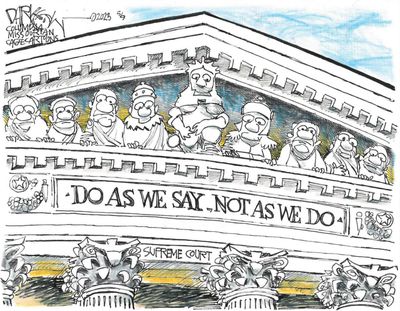by Jacob Fischler, Georgia Recorder
October 2, 2022
When the U.S. Supreme Court opens its fall term on Monday, a few things will be different.
A Black woman, Justice Ketanji Brown Jackson, will hear oral arguments for the first time ever. And the public will be allowed into the room for the first time since early 2020.
The content of the term’s first case, though, will be familiar to many who have followed federal water policy for the past several years. The case is a challenge to the definition of “waters of the United States,” which delineates which wetlands the federal government can regulate under the Clean Water Act.
The case, brought by an Idaho couple, could further restrict the Environmental Protection Agency’s authority to regulate environmental protections, just as one of the last decisions by the conservative majority in the most recent term curbed the agency’s power to regulate greenhouse gases.
A history-making day
Monday will be the first day Jackson joins the ritual of oral arguments in the ornate chamber as one of nine Supreme Court justices. Jackson, a Harvard Law School grad and former federal judge who grew up in Miami, took the oath of office in June following an often–contentious Senate confirmation process.
On Friday, she took part in an investiture ceremony, which mirrors stylistic aspects of the swearing-in. The investiture, though, is purely symbolic. Jackson has been a member of the court since taking her oath of office.
Although the event was only symbolic, President Joe Biden and a handful of top White House staff members, along with several members of Congress, including Rep. Hank Johnson of Lithonia and Sens. Amy Klobuchar of Minnesota and Cory Booker of New Jersey, all Democrats, attended the six-minute event.
Booker, who is Black, brought tears to Jackson’s eyes at a fraught time in the confirmation hearing when he spoke of the importance of Jackson’s role in history and as a role model to young Black people.
U.S. Sen. Ben Sasse, a Nebraska Republican who sits on the Judiciary Committee, was the only senator who voted against Jackson’s confirmation to attend Friday’s ceremony. His presence seemed intended to make a point about the need to respect institutions, even amid good-faith disagreement with individuals.
In a statement, Sasse, who is white, said that he disagreed with Jackson’s judicial philosophy but that their disagreement was respectful and impersonal. He urged members of both parties not to attack the court itself.
“Right now, there’s a lot of sound and fury about whether or not the Supreme Court has lost legitimacy,” Sasse said in the statement. “It’s a load of bunk. The Court’s legitimacy comes from its constitutional role, not the popularity of its opinions. I’m certain that I won’t agree with all of Justice Jackson’s opinions, but I’m not going to attack the credibility of the Court when we see things differently, and I wish more of my colleagues would take a similar approach.”
During the March hearings at the Judiciary Committee, Sasse avoided the most salacious attacks on Jackson launched by other Republicans and bemoaned publicity-seeking “jackassery” in the chamber.
Court’s legitimacy
Jackson is not expected to affect the court’s ideological balance, as she replaced Stephen Breyer, who’d been among the court’s liberal minority before his retirement.
With three justices appointed by former President Donald Trump, the court’s last term was its most conservative in decades, culminating with a ruling overturning Roe. v. Wade, the landmark 1973 case that guaranteed the right to an abortion nationally.
The three liberal justices, Elena Kagan, Sonia Sotomayor and the since-retired Breyer, wrote a scathing dissent that the decision “undermines the Court’s legitimacy.”
The court’s departure from its own precedent in the Dobbs case “calls into question this Court’s commitment to legal principle,” they wrote. “It makes the Court appear not restrained but aggressive, not modest but grasping. In all those ways, today’s decision takes aim, we fear, at the rule of law.”
Americans’ opinions of the court have declined over the past two years, along with its rightward shift. A nationwide Marquette Law School poll conducted in September found 60% of respondents disapproved of the court, while only 40% approved. The results represented a 53-point drop in net favorability from the same survey in 2020, when twice as many respondents held favorable views as those with unfavorable views.
Other events have also threatened the court’s reputation.
Justice Clarence Thomas did not recuse himself from a case about the House Jan. 6 committee’s access to presidential records and was the sole justice to vote in favor of restricting those records. The records later showed that his wife, Nebraska native Virginia “Ginni” Thomas, had exchanged several texts with then-White House Chief of Staff Mark Meadows spreading false claims that the election was stolen.
Additionally, a draft of the Dobbs decision overturning Roe v. Wade was leaked to news media months before it was published in what several experts said was an “unprecedented” breach of the court’s protocol that launched an internal investigation.
New court rules, old issue
Monday will mark the first time since March 2020 that the court will allow the public to attend oral arguments. Masks will be optional.
The court will continue to live-stream audio from oral arguments, a practice the staid court only adopted while it limited attendance during the pandemic.
The first oral arguments made under the new rules involve the EPA’s authority under the Clean Water Act to regulate “waters of the United States.” The 1972 law changed the criteria for what constituted a federally protected waterway away from one that is navigable to any “waters of the United States.”
That definition has shifted since the law was passed, and particularly as the last three presidential administrations have enacted rules to define it.
In 2015, President Barack Obama’s administration issued a definition that some, especially Republicans, viewed as expanding federal jurisdiction. His successor, Donald Trump, took steps to loosen the definition in 2020, but a federal court vacated that move in 2021.
Last year, under Biden, the EPA and Army Corps of Engineers said they would interpret the phrase consistent with a pre-2015 definition while they worked on updating a more permanent version. A Supreme Court ruling will likely come before that rule is finalized.
An Idaho couple, the Sacketts, own a parcel of land near Priest Lake in the state’s panhandle. Their land is within 30 feet of a tributary to the lake. The EPA has claimed that parcel is within its jurisdiction to regulate as a navigable waterway, and the Sacketts disagree.
The Sacketts are among the many farmers and other private landowners seeking a reprieve from federal regulation of wetlands on their property.
A federal appeals court ruled last year in favor of the federal agency, but the Supreme Court’s decision to hear the case could mean it will overturn the lower court’s ruling.
GET THE MORNING HEADLINES DELIVERED TO YOUR INBOX SUBSCRIBE
Georgia Recorder is part of States Newsroom, a network of news bureaus supported by grants and a coalition of donors as a 501c(3) public charity. Georgia Recorder maintains editorial independence. Contact Editor John McCosh for questions: info@georgiarecorder.com. Follow Georgia Recorder on Facebook and Twitter.




